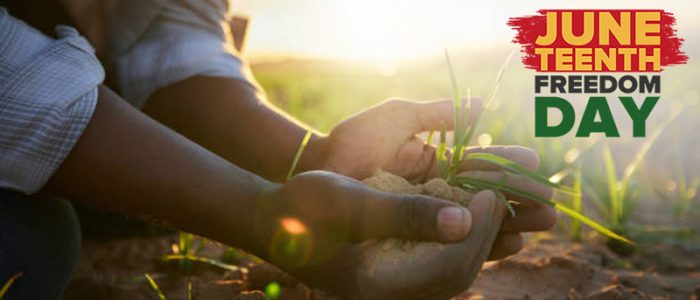JUNE 2022 (Updated JUNE 2024)
Enslaved Africans were brought to this country and others to cultivate the land, and U.S. farming communities were transformed because of Black and Indigenous Americans sweat equity
Juneteenth is a commemoration of June 19, 1865, when enslaved people in the farthest part of the Confederacy were freed, over two years after the issuance of the Emancipation Proclamation. Juneteenth is a celebration of emancipation, a recognition of the historical and ongoing injustices against Black people, and a call for action toward greater liberation.
Throughout history, Black farmers, growers, and producers have played a transformative role in shaping the agricultural system. Equity and justice are important components of health and wellbeing and we all play a role in creating more inclusive and just spaces for all communities in agriculture.
In honor of Juneteenth, we at UMASH,
- Celebrate the many contributions of Black farmers to agriculture
- Acknowledge the reality of structural racism and the resulting inequities and injustices experienced by Black farmers
- And, most importantly, commit to elevating Black and Indigenous farmers and supporting the health and safety of diverse agricultural communities
As many of us know, farming can be a venue for healing. Here are opportunities to learn more and support equity, justice, and liberation in agriculture.
- WATCH videos and documentaries exploring Black Farmers legacy in agriculture, like Growing a New Generation of Black Farmers and Gaining Ground
- READ articles and books celebrating African American Farmers, like We Are Each Other’s Harvest
- DISCOVER artistic projects showcasing Black Farmer narratives, like Still Here – African American Farmers in the 21st Century and Rhythms of the Land.
- LISTEN to podcasts shedding light on the complex history of African Americans in agriculture, like What Happened to Black Farmers? (43:15), and The Resurgence of Black Farming (33:54).
- Midwest Farmers of Color Collective – a collective of Black, Indigenous, Farmers of Color (BIPOC), centered on racial justice and the development of food and farming systems that honor our communities past, present and future
- 40 Acre Co-op – the first national black farmer co-op since the reconstruction era in the United States
- Rural Voices for Racial Justice – a video series featuring Land Stewardship Project members across the Upper Midwest who are amplifying their voices for racial justice in the food and farming system.
- National Black Farmers Association – a non-profit organization representing African American farmers and their families in the United States focused on civil rights, land retention, access to public and private loans, education and agricultural training, and rural economic development for black and other small farmers.
- Black Farmers Network – a site for rural, African-American farmers to share stories, products and services in a now digital-driven economy. The network also documents the agribusiness successes of these first-year to centennial farmers — farmers who have had to confront a discriminating history for centuries in America’s Black Belt Region. The network also provides 21st-century marketing and branding strategies to help their rural enterprises grow and sustain online.


 WATCH
WATCH  LISTEN
LISTEN  READ
READ